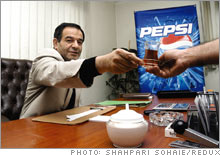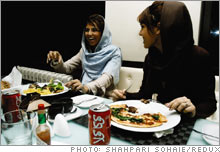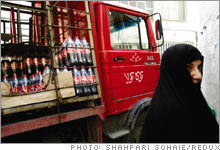Iran's cola warSanctions? Coke and Pepsi found a way around them and are battling for market share in Tehran with local Zamzam Cola. Fortune's Eric Ellis reports.(Fortune Magazine) -- Lunchtime in Tehran's tony northern suburbs, and around the crowded tables at Nayeb restaurant, elegant Iranian women in Jackie O sunglasses and designer jeans pick at grilled Alborz trout and salad, their table chatter gliding effortlessly between French, English and their native Farsi. The only visual clues that these lunching ladies aren't dining at some smart New York City eatery but in the heart of Washington's Axis of Evil are the expensive Herm�s scarves covering their blond-tipped hair in deference to the mullahs. And the drink of choice? This being revolutionary Iran, where alcohol is banned, the women are making do with Coca-Cola.
Coca-Cola? Isn't corporate America prohibited by Washington's sanctions from doing business in Iran? Yes, for the most part, says U.S. Treasury spokeswoman Molly Millerwise. But Treasury has bent the rules for foodstuffs, a loophole through which American drinks giants Coca-Cola (Charts) and PepsiCo (Charts) have been able to pour thousands of gallons of concentrate into Iran via Irish subsidiaries. And that has allowed these brands, so much a symbol of America - and so much an affront to Iran's conservative clerics - to open another front in their global cola war. After just a few years back in Iran, Coke and Pepsi have grabbed about half the national soft drink sales in what is one of the Middle East's biggest drinks market. That may be good news in Atlanta and Purchase, N.Y., respectively, where the companies are based, but it's a hard fact for some of Iran's theocrats to swallow. They want Iranians to shun "Great Satan" brands like Coke and Pepsi, which they claim send profits from Iranian sales to Israel. Hardliners like Mehdi Minai, a senior official of the Public Demands Council, frequently appear on state TV to denounce Coke and Pepsi, which he says stands for "Pay each penny to save Israel." Minai would rather Iranians drink Zamzam Cola, named after a blessed well in Mecca, the holiest place in Islam, or other local brands produced by Khoshgovar, which licenses Coke, and Sasan, which has the Pepsi franchise. But Iran's trendy young consumers are not as engaged in the Palestinian conflict as their Arab neighbors, anti-U.S. protests draw tiny crowds in Tehran these days, and opinion polls suggest that Iranians are tired of their government's standoff with Washington over uranium enrichment. "I joke with customers not to buy this stuff because it's American," says Tehran storekeeper Reza Shahgholi, "but they don't care. That only makes them want to buy it more." Zamzam's 17 plants bottled Pepsi before the 1979 Islamist revolution. Now the company is controlled by the Foundation of the Dispossessed, a powerful bonyad, one of many religious charities Ayatollah Ruhollah Khomeini used to quasi-nationalize Iran's economy. Conceived as a way of helping Iran's needy, the bonyads have become gold mines for the powerful. In the case of Zamzam, it answers to Iran's Supreme Leader, Ayatollah Ali Khamenei, and Minai is lobbying him hard for a ban on the U.S. brands. Coke and Pepsi shrug off the hardliner rhetoric and insist they are aren't breaking any laws - American or Iranian - by licensing products in Iran through their concentrate subsidiaries in Ireland. Says Pepsi spokesman Dick Detwiler: "PepsiCo has no equity investment in Sasan or any other enterprise in Iran and has no relationship with the government of Iran. We sell in strict accordance with all applicable U.S. laws and restrictions." Coke spokesman Charles Sutlive echoes Pepsi's line, adding that Coke, which also licenses Fanta, Sprite and Dasani water through Khoshgovar, has "no tangible assets in Iran." Sasan managing director E. Morad Abadi is also sanguine about his Iranian critics. "We don't listen to such remarks," he says. "Iran's law doesn't say such a thing, so for us it's business as usual." |
Sponsors
|



